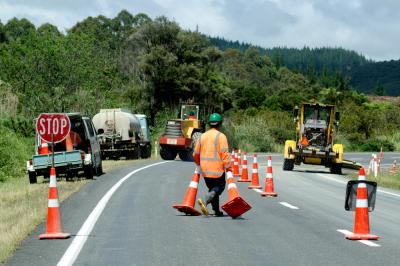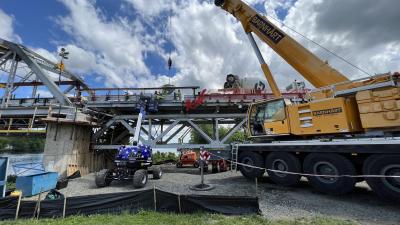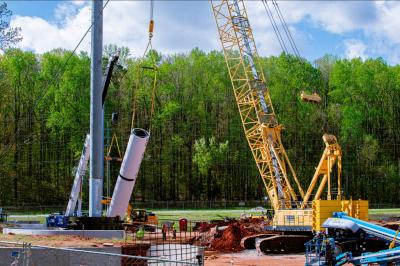BOSTON (AP) - When the state began allowing flagmen onto roadways seven years ago, Jeffrey Graham saw an opportunity to expand his regional business into a multi-million-dollar market that until then was dominated by police details.
Initially, business was good. Graham picked up a few bids a year for traffic control at construction sites throughout the Bay State. But after a while, he stopped getting calls.
”I haven’t done a job in Massachusetts in probably more than two years,’ said Graham, owner of New England Traffic Control Services, based in Epsom, N.H. ”The work just dried up. It’s really unfortunate.’
Graham and others with traffic control businesses say a state law passed in 2008, meant to open traffic details to the private sector, instead allows police to maintain a long-standing monopoly on roadwork jobs.
For one, the law requires police officers to conduct traffic on all roads with speed limits of 45 mph or higher, which includes most major roadways.
Secondly, the law gives cities and towns the authority to bypass the requirement to use flaggers for work done on local roads, including jobs by utility companies.
Likewise, most police union contracts require officers be assigned to details in which the city or town is footing the bill, as provided by the 2008 law.
Graham said another factor is the state’s prevailing wage law, which requires private flaggers to be paid more than $45 per hour, depending on the region of the state. That doesn’t include insurance and others costs that add to the hourly wages for flagmen.
The deck is stacked in favor of police officers, he said.
Former Gov. Deval Patrick, a Democrat who left office in January, led the effort to replace police officers with flagmen on road details as part of a cost-savings plan. He was met with fierce opposition from police unions. Lawmakers eventually passed a weaker version of his legislation.
While the state Department of Transportation says the move saved millions of dollars a year, it still relies heavily on police details.
Of nearly $25 million spent on traffic control for MassDOT work in fiscal 2014, only $845,686 went to flagging companies, according to the department.
And cities including Lawrence, Newburyport and Salem still rely exclusively on police officers, instead of private flagmen.
Chip Faulkner, associate director of the Marblehead-based Citizens for Limited Taxation, said the loopholes in state regulations fuel an entitlement mentality among police who use details to boost their pay.
"It’s a big perk," he said. "We’re the only state in the country that still uses police details this extensively. It’s a poster child for government waste."
Faulkner said cities and towns could save money on major projects by hiring private flaggers over police officers, who get paid $50 an hour or more to direct traffic, depending on their union contracts and rank.
Law enforcement officials defend police control at construction sites. While costs may be higher, they argue for the added benefit of putting another cop out on the street.
"We have officers that interrupt crimes or even something as simple as giving someone directions while they’re out there," said Lawrence Police Chief James Fitzpatrick. "It comes down to a question of public safety."
MassDOT officials said the changes have reduced the costs to taxpayers by allowing the state to pay only for the amount of time a flagman or officer is on the job. Before the law was enacted, the state was required to pay police a minimum number of hours for details.
"While spending on construction has increased, overall the cost of traffic control has decreased," said Michael Verseckes, a department spokesman.
But a 2009 state audit, one year after the law was enacted, found that transportation officials "overstated" the estimated savings of the law, from $5.7 million to $7.2 million a year.
Meanwhile, lawmakers are proposing rules to give police even more control over traffic details.
One bill, filed by Sen. James Timilty, D-Walpole, would prohibit flaggers from working state highway jobs unless the highway department would save at least 20 percent from a police detail.
Timilty _ who received more than $20,000 in contributions from state and local police unions since 2008, according to the state Office of Campaign and Political Finance _ didn’t return a message left seeking comment.
Neither did the State Police Association of Massachusetts, which represents troopers. It referred questions about details to a public relations firm, Liberty Square Group, which declined to comment.
In New Hampshire, transportation officials rely mostly on flagmen for traffic details, even on some highways.
"We all know that people slow down more for blue lights than orange vests, but we try to balance that out as much as possible," said Bill Boynton, a spokesman for the New Hampshire Department of Transportation.
Graham said the prevailing wage in New Hampshire for a flagger is about $20 an hour, compared to about $50 an hour for police details.
"That’s a great wage for a flagger," he said. "And it’s a big savings for the state."
Flagging companies say they’ve been intimidated by police officers in Massachusetts and in some cases even forced off local construction sites after police unions filed grievances against cities and towns for hiring private flagmen.
Fiscal watchdogs said there appears to be little appetite among state leaders to change the law.
"The police officers in Massachusetts are exploiting a monopoly," said Frank Conte, a policy analyst for the Beacon Hill Institute, a conservative think tank at Suffolk University in Boston. "And nobody has the political will to change it."
Today's top stories















